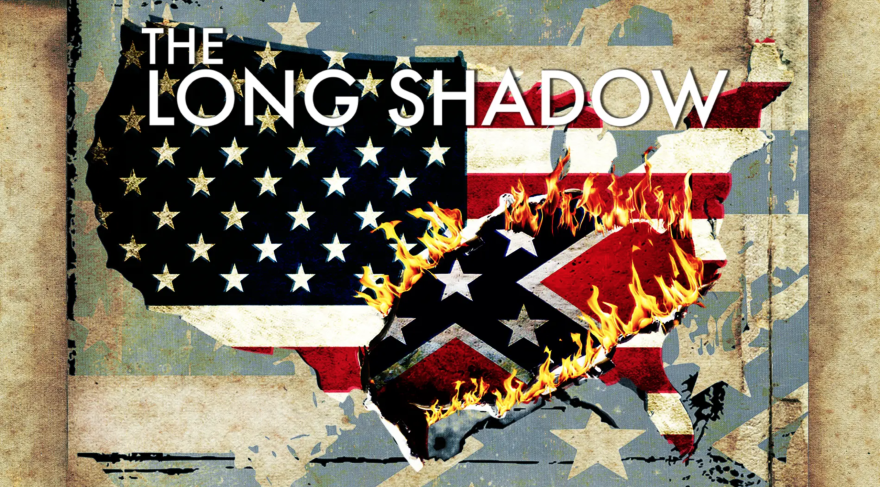The First Presbyterian Church of Murray and Frances Causey, a director of The Long Shadow, have partnered to present a virtual screening of the powerful documentary that shines light on the disturbing and often unseen legacy of systemic racism within the United States. Murray State professor of history and member of FPC, Dr. David Pizzo, speaks to Tracy Ross about the online screening and following Zoom discussion.
The Long Shadow was created by "privileged daughters of the South...haunted by their families' slave-owning pasts, passionately [seeking] the hidden truth and the untold stories of how America -- guided by the South's powerful political influence -- steadily, deliberately, and at times secretly, established white privilege in [the United States'] institutions, laws, culture, and economy."
"The pastor of First Presbyterian, Renee Meyer, and I were trying to figure out how First Presbyterian MOTA [Ministry Open to All - the church's campus outreach program] could do something about structural racism and interface more closely with our community," Pizzo begins. "Ultimately...our church is still quite white and fairly affluent, so we're very much cut off from the reality of a lot of things like police violence or redlining."
Brian Clardy, another faculty member of Murray State's History Department, suggested reaching out to Causey to plan a screening of her film. "Anybody who wants to do something like this, whether you're a church or university group, I do encourage you to reach out to [The Long Shadow's production team]. They are incredibly responsive and helpful," Pizzo says.
"The film itself deals with...the legacy of racism and intergenerational culpabilities," Pizzo continues. "Most southerners did not [own slaves], but they were absolutely implicated in part of that structure. Indeed, the North was part of that structure as well. It was definitiely a national, global [problem]. [Causey] explores that issue of, how do we deal with the past? This gets into issues of white fragility. It touches on the issue of reparations."
The film is available for viewing online now through next Wednesday on the documentary's website, or at any time on Amazon Prime. On Sunday, August 9th, at 5 p.m. [CST], there will be a panel discussion with the director of the film, Pizzo, Clardy, and Meyer via Zoom. Pizzo encourages those wishing to participate to watch either the 15 or 90-minute film prior to the discussion, although it is not required. "This is aimed very much at the community because most university people aren't here right now, at least in terms of students. So there's going to be a second run of this probably very similarly scheduled -- maybe with different panelists -- in October."
Pizzo admits that while in-person discussions offer more connection in terms of body language and presence, there are positive offsets from having to keep this presentation virtual. "One [is] us not getting the coronavirus," Pizzo says. "Two, I'm going to be blunt; it allays some of my security concerns. There's a very real threat now, especially with that festering and eruption about the [Robert E. Lee monument on Murray's courthouse square]. There's literally an armed militia part-time guarding it with assault weapons downtown. So far, my experiences in Murray have been fairly positive...but I'm not sad that we don't have to deal with it at all. I hate to say that, but welcome to 2020."
"The other thing that's good is we can reach so many more people this way," he continues. "There's not really a cap on this. For people who don't like crowds, even pre-corona, or can't drive because it's inconvenient or far away, I think this gives us a chance to reach people that we wouldn't otherwise. While I'll be the first to admit that something about the effervescence of live performance is gone, there are a lot of offsets that make me happy we're doing it this way."
The tensions between those who support the relocation of the Confederate monument and those who do not brought the issue of systemic racism to western Kentucky's front door. Due to the area's predominantly Euro-American population, "I think a lot of people...can ignore this problem a lot of the time," Pizzo explains. "That's sort of a willful ignoring. I think for better or for worse, I would argue...the debate about the monument has made it harder to ignore if not police violence...this issue of structural racism and narrative and how we understand our own history. Murray's self-identified history - and I think even I buy into this to a certain degree - is this cute, quiet, little town where everyone is super nice. The nicest town in America. But...the very week back in 1913 when fundraising for that monument began, one of the only Black families in Murray was driven out of the city with pitchforks and torches. That's the sort of thing we do not remember here anymore."
"Even more grizzly things happened right down the road. In Marshall County...it's still known as a sundown town," Pizzo says. "In 1908, the entire Black town of Birmingham was basically burned to the ground. People were driven out and murdered. The county was basically ethnically cleansed. That event lives on as knowledge of the night riders, but that racial...part of it is gone in public memory." Additionally, "the town itself is literally underwater. When the dams were built, it was flooded. So it's vanished both metaphorically, in terms of public memory, and physically. It's been erased."
"I think for better or for worse, this 'move the monument' debate has really pushed us to not ignore that really troubled history that, in some ways, makes us like everywhere else. But I think we'd really like to think of ourselves as not like everywhere else in this town."
Visit The Long Shadow's websitefor a link to the online screening and Zoom panel discussion on Sunday the 9th. You can also submit any questions for the panel in advance through the website.






